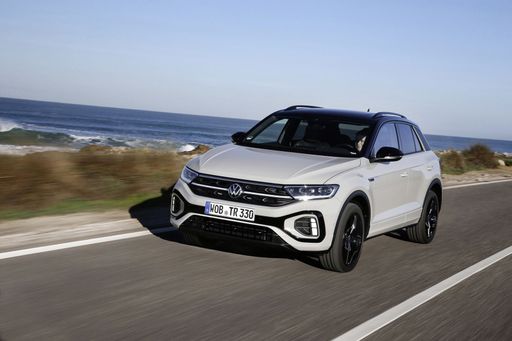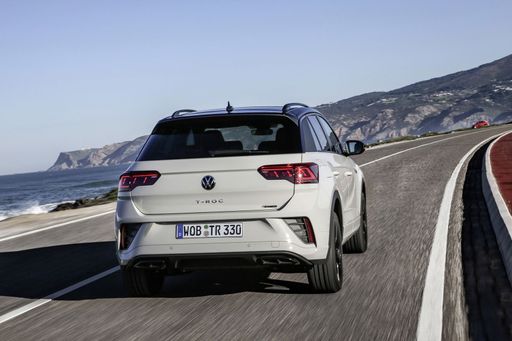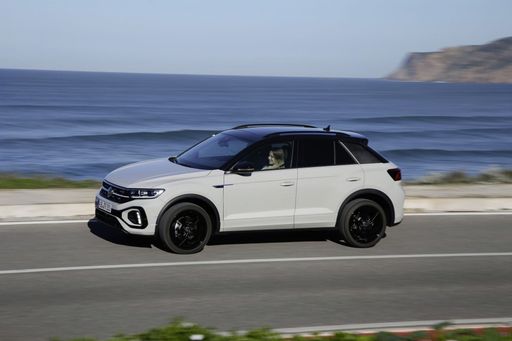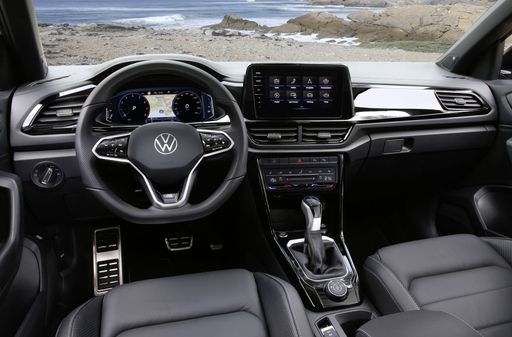VW T-Roc vs VW Tiguan – Differences & prices compared
Compare performance, boot space, consumption and price in one view.
Find out now: which car is the better choice for you – VW T-Roc or VW Tiguan?
The VW T-Roc (SUV) comes with a Petrol or Petrol MHEV engine and Manuel or Automatic transmission. In comparison, the VW Tiguan (SUV) features a Plugin Hybrid, Petrol, Petrol MHEV or Diesel engine with Automatic transmission.
When it comes to boot capacity, the VW T-Roc offers 475 L, while the VW Tiguan provides 652 L – depending on how much space you need. If you’re looking for more power, decide whether the 150 HP of the VW T-Roc or the 272 HP of the VW Tiguan suits your needs better.
In terms of consumption, the values are 5.50 L per 100 km for the VW T-Roc, and 0.40 L for the VW Tiguan.
Price-wise, the VW T-Roc starts at 26400 £, while the VW Tiguan is available from 32800 £. Compare all the details and find out which model fits your lifestyle best!
In the competitive compact SUV segment, the VW T-Roc and VW Tiguan stand out, each offering a distinct blend of style and versatility. The T-Roc appeals to younger buyers seeking a sporty, agile ride with its dynamic design and customizable options, while the Tiguan caters to families needing more space and practicality without compromising on performance. Ultimately, the choice between these two popular models comes down to personal preferences in size, features, and driving experience.
VW T-Roc
The VW T-Roc seamlessly blends stylish design with practical functionality, making it an ideal choice for those who enjoy both urban and countryside driving. Its modern interior features intuitive technology and comfortable seating, enhancing the overall driving experience. With its robust build and dynamic performance, the T-Roc is equipped to handle various road conditions with confidence.
details @ Volkswagen
@ Volkswagen
 @ Volkswagen
@ Volkswagen
 @ Volkswagen
@ Volkswagen
 @ Volkswagen
@ Volkswagen
VW Tiguan
The VW Tiguan presents itself as a versatile and practical option in the SUV market, combining a stylish design with a spacious and comfortable interior. It offers a smooth driving experience, making it well-suited for both urban environments and longer journeys. With its focus on safety and innovative technology features, the Tiguan remains a compelling choice for families and adventurers alike.
details @ Volkswagen
@ Volkswagen
 @ Volkswagen
@ Volkswagen
 @ Volkswagen
@ Volkswagen
 @ Volkswagen
@ Volkswagen
 @ Volkswagen
@ Volkswagen
 @ Volkswagen
@ Volkswagen
When it comes to compact SUVs, the Volkswagen T-Roc and Tiguan are two standout models that cater to different needs while sharing VW's renowned engineering. This article delves into a comprehensive comparison of both cars across various technical aspects, innovations, and the driving experience they offer.
Design and Dimensions
The T-Roc is compact and sporty, measuring 4,236 mm in length and 1,819 mm in width. Its design emphasizes agility, with a height of 1,584 mm that contributes to an athletic stance. On the other hand, the Tiguan is a larger vehicle, stretching to 4,539 mm in length and 1,842 mm in width, which translates to extra interior space. The Tiguan stands a bit taller at 1,658 mm, providing a commanding view of the road.
Powertrain Options and Performance
The T-Roc comes equipped with a range of engines, including turbocharged petrol and diesel options, delivering power outputs from 115 HP to a potent 300 HP. Depending on the variant, it offers both front-wheel and all-wheel drive configurations. The T-Roc accelerates from 0-100 km/h in as little as 4.9 seconds for the high-performance model.
In contrast, the Tiguan's engine lineup includes petrol mild-hybrid, plug-in hybrid, and diesel engines, ranging from 130 HP to 272 HP. With its larger engines, the Tiguan achieves 0-100 km/h in as quickly as 5.9 seconds. Both vehicles feature dual-clutch automatic transmissions, ensuring quick gear changes and a smooth driving experience.
Fuel Efficiency and Emissions
The T-Roc boasts an impressive fuel consumption rate, with figures as low as 4.7 L/100 km for its most efficient variants. Its CO2 emissions vary from 125 to 194 g/km, depending on the engine choice. The SUV's lighter curb weight is also advantageous for fuel efficiency.
The Tiguan, while slightly heavier, offers competitive fuel consumption, particularly with its plug-in hybrid option that can run solely on electric for up to 112 km on a full charge. Its trusty petrol and diesel variants deliver efficiency figures starting from 5.3 L/100 km to 6.4 L/100 km, with CO2 emissions ranging from 139 to 193 g/km.
Technology and Innovations
Both the T-Roc and Tiguan feature a suite of advanced technologies aimed at enhancing convenience and safety. The T-Roc offers an intuitive infotainment system with a responsive touchscreen, smartphone integration via Apple CarPlay and Android Auto, as well as a range of driver assistance features such as adaptive cruise control and lane keeping assist.
The Tiguan, however, steps it up a notch with its larger infotainment display and an available digital cockpit. This high-definition instrument panel provides customizable displays for better driver engagement. Additionally, it boasts a wider array of driver assistance technologies, including a more sophisticated adaptive cruise control system that can navigate traffic conditions, making road trips a breeze.
Interior Space and Comfort
In terms of seating capacity, both models accommodate five passengers comfortably. The T-Roc offers a trunk capacity of 445 liters, which is practical for urban living. In contrast, the Tiguan excels in space with a trunk capacity of up to 652 liters, making it ideal for families or those needing extra cargo space.
The interior quality in both vehicles aligns with VW's high standards, but the Tiguan’s larger dimensions allow for more legroom and headroom, enhancing passenger comfort during long journeys.
Conclusion: Which One Should You Choose?
Ultimately, the choice between the VW T-Roc and Tiguan revolves around your preferences and needs. If you desire a sporty, agile SUV with impressive fuel efficiency and modern technology, the T-Roc stands out as a thrilling option. However, if you require more space, advanced hybrid technology, and enhanced driver assistance features, the Tiguan is likely the better fit.
Regardless of your choice, both vehicles offer Volkswagen’s commitment to quality, safety, and performance, ensuring a satisfying driving experience in their own unique ways.

|

|
|
|
|
Costs and Consumption |
|
|---|---|
|
Price
26400 - 38000 £
|
Price
32800 - 51000 £
|
|
Consumption L/100km
5.5 - 6.3 L
|
Consumption L/100km
0.4 - 8.5 L
|
|
Consumption kWh/100km
-
|
Consumption kWh/100km
-
|
|
Electric Range
-
|
Electric Range
119 - 129 km
|
|
Battery Capacity
-
|
Battery Capacity
19.70 kWh
|
|
co2
126 - 143 g/km
|
co2
8 - 193 g/km
|
|
Fuel tank capacity
50 L
|
Fuel tank capacity
45 - 58 L
|
Dimensions and Body |
|
|---|---|
|
Body Type
SUV
|
Body Type
SUV
|
|
Seats
4 - 5
|
Seats
5
|
|
Doors
2 - 5
|
Doors
5
|
|
Curb weight
1465 - 1539 kg
|
Curb weight
1599 - 1890 kg
|
|
Trunk capacity
284 - 475 L
|
Trunk capacity
490 - 652 L
|
|
Length
4271 - 4373 mm
|
Length
4539 mm
|
|
Width
1811 - 1828 mm
|
Width
1842 - 1859 mm
|
|
Height
1527 - 1573 mm
|
Height
1656 - 1658 mm
|
|
Payload
368 - 515 kg
|
Payload
460 - 533 kg
|
Engine and Performance |
|
|---|---|
|
Engine Type
Petrol, Petrol MHEV
|
Engine Type
Plugin Hybrid, Petrol, Petrol MHEV, Diesel
|
|
Transmission
Manuel, Automatic
|
Transmission
Automatic
|
|
Transmission Detail
Manual Gearbox, Dual-Clutch Automatic
|
Transmission Detail
Dual-Clutch Automatic
|
|
Drive Type
Front-Wheel Drive
|
Drive Type
Front-Wheel Drive, All-Wheel Drive
|
|
Power HP
115 - 150 HP
|
Power HP
130 - 272 HP
|
|
Acceleration 0-100km/h
8.9 - 12.3 s
|
Acceleration 0-100km/h
5.9 - 10.6 s
|
|
Max Speed
187 - 212 km/h
|
Max Speed
198 - 242 km/h
|
|
Torque
200 - 250 Nm
|
Torque
220 - 400 Nm
|
|
Number of Cylinders
3 - 4
|
Number of Cylinders
4
|
|
Power kW
85 - 110 kW
|
Power kW
96 - 200 kW
|
|
Engine capacity
999 - 1498 cm3
|
Engine capacity
1498 - 1984 cm3
|
General |
|
|---|---|
|
Model Year
2024 - 2025
|
Model Year
2024 - 2025
|
|
CO2 Efficiency Class
E, D
|
CO2 Efficiency Class
B, G, D, E, F
|
|
Brand
VW
|
Brand
VW
|
VW T-Roc
The VW T-Roc: A Blend of Style and Innovation
The Volkswagen T-Roc stands out in the competitive compact SUV segment, offering a dynamic combination of innovative technology and stylish design. The model has evolved since its inception, embracing new features and engineering advancements that appeal to a broad spectrum of drivers.
Engine Performance and Efficiency
The VW T-Roc provides an impressive range of engine options to meet various driving preferences. From the economical 1.0 TSI petrol engines to the robust 2.0 TDI diesels, there’s an engine to match every need. The power output spans from 115 PS to a thrilling 300 PS in the T-Roc R variant. Fuel efficiency is another highlight, with consumption figures ranging between 4.7 and 8.5 L/100 km, making it a practical choice for both city and long-distance driving.
Advanced Technology and Safety Features
Volkswagen has equipped the T-Roc with state-of-the-art technology to enhance both convenience and safety. The latest models include advanced driver assistance systems, such as adaptive cruise control and lane-keeping assist, which provide a safer driving experience. Additionally, the intuitive infotainment system supports a seamless connection to smartphones via Apple CarPlay and Android Auto.
Design and Customisation
The T-Roc’s design is bold and contemporary, reflecting its sporty nature. With a wide array of customisation options, including various trim levels like Life, Style, and the sporty R-Line, there are plenty of opportunities for personal expression. Both the interior and exterior can be tailored, with choices ranging from colour accents to different upholstery options, ensuring each T-Roc feels unique to its owner.
Spacious Interior and Practicality
Despite its compact exterior dimensions, the T-Roc offers a surprisingly spacious interior. It accommodates between four and five passengers comfortably, with ample legroom and headroom. The flexibility extends to the boot space, which ranges from 284 to 445 litres, depending on the configuration, providing practical storage capacity for everyday use or weekend getaways.
Conclusion: A Competitive SUV Choice
Overall, the VW T-Roc continues to be a strong contender in the compact SUV market, combining innovative features, efficient engines, and a distinctive design. It appeals to those looking for versatility and performance in a stylish package, making it an attractive option for both families and individual adventurers alike.
VW Tiguan
Introducing the VW Tiguan: A Blend of Style and Innovation
The VW Tiguan has consistently been a popular choice among SUV enthusiasts, combining practicality with a touch of elegance. In the latest iteration, Volkswagen has continued this tradition with a range of technical updates and innovations.
Powertrains: Versatility Meets Efficiency
The VW Tiguan comes with a variety of engine options, catering to different preferences and needs. From the efficient petrol mild-hybrid variants to the environmentally friendly plug-in hybrids, and the robust diesel engines, there is something for everyone. The power output ranges from a modest 130 PS to an impressive 272 PS, ensuring that drivers can enjoy a powerful and dynamic driving experience.
Innovation remains at the heart of the Tiguan’s engineering. The plug-in hybrid models, for example, boast an electric range of up to 113 km, making them ideal for those looking to reduce their carbon footprint while still enjoying the flexibility of a traditional engine.
Advanced Transmission and Drivetrain
Equipped with a smooth and responsive automatic transmission, the Tiguan ensures a comfortable drive. The dual-clutch gearbox provides quick and seamless gear changes, enhancing the driving experience. Additionally, the Tiguan is available in both front-wheel and all-wheel drive configurations, offering excellent traction and stability across different driving conditions.
Performance and Efficiency
The Tiguan's performance capabilities are complemented by its efficiency. With fuel consumption as low as 0.4 L/100km for hybrid models, owners can enjoy long trips with fewer stops for refuelling. The CO2 emissions are also impressively low, aligning with modern environmental standards and expectations.
Design and Dimensions
The Tiguan’s aesthetic appeal is undeniable, with a robust character that exudes confidence and sophistication. Its dimensions—4,539mm in length, 1,842 to 1,859 mm in width, and up to 1,658mm in height—provide ample interior space, making it a versatile vehicle for families and adventure seekers alike.
Practicality is further emphasised by its sizeable boot space, ranging from 490 to 652 litres, ensuring plenty of room for luggage or shopping.
Safety and Technology
Volkswagen has not compromised on safety or technology. The Tiguan is equipped with the latest driver assistance systems, ensuring a safe journey for its occupants. Features like adaptive cruise control, lane assist, and emergency braking provide an extra layer of protection.
Pricing and Value
Starting from €38,250 to €59,535, the Tiguan offers a range of specifications and features to match different budgets. When considering the advanced technology, engine options, and the premium feel of the cabin, it presents excellent value for money.
Conclusion: The Ultimate SUV Experience
The VW Tiguan continues to impress with its blend of innovative technology, performance, and practicality. Whether you’re looking for an eco-friendly hybrid with a long electric range or a powerful diesel for longer hauls, the Tiguan provides an all-encompassing solution. With its refined design and superior comfort, it remains a leading choice in the SUV segment.
Which drive types are available for the VW T-Roc?
Available as Front-Wheel Drive.
The prices and data displayed are estimates based on German list prices and may vary by country. This information is not legally binding.
